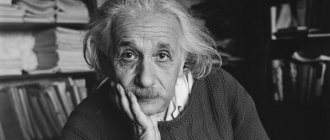Genius is the highest level of unique realization of the creative, mental, and active capabilities of the individual, which are expressed in science, creativity, and inventions. These are achievements that can bring some area of human manifestation to a new level of development. Human genius is associated with the concepts of inspiration, innovation, originality, and implies the highest degree of productivity and speed of implementation relative to the average representative. Points of view regarding the definition of genius are varied, from a divine spark to the condition of mental abnormalities. Psychoanalysis considers genius as the fruit of the sublimation of intimacy, the Gestalt approach as the individual’s ability to gain insight.
In psychology, genius is a unique deviation from the norm of the majority, which is less common than all other deviations, and has accompanying other deviations relating to the body.
Genius is one of the most elusive and most fascinating concepts in psychology. What is super-giftedness and the exact parameters of its definition have not been established. Scientists, philosophers, and psychologists have made numerous attempts over the centuries to explain the nature of the emergence of genius. However, it is generally accepted that genius involves creative abilities that exceed the level of the average person, which relate to any field, i.e. a person of genius is capable of fairly high results in areas that are not related to his main talent. These skills are assessed in the context of social culture and the time in which a person lives, because genius is a social phenomenon and can only be considered by comparing socio-temporal conditions.
Human genius is determined by four types of theories.
The pathological theory finds a connection between genius and madness; arose from observations of geniuses who often exhibited nervous disorders, trance states, a tendency toward neurosis, and so on. Features characteristic of geniuses are also inherent in the insane (unconsciousness of creativity, increased sensitivity, sudden changes in mood, etc.), but people with mental disorders do not produce brilliant creations.
In psychoanalytic theory, genius is explained not by the presence of any super abilities in a person, but by the direction in which they are directed, how they are applied and developed under the influence of motivation. This is where the idea of sublimating sexual energy into creative activity is born, as well as compensating for one’s shortcomings through the development of other qualities.
In the theory of genius of qualitative superiority, the idea that geniuses have shortcomings is not allowed; they are recognized as a more highly developed, distinguished from the rest, type of people, possessing more developed abilities.
The theory of quantitative superiority defines agility not in terms of special abilities, but as a favorable confluence of social and economic factors for the development of abilities that are equally inherent in the human being.
Genius is studied through biographical analysis, statistical research, intelligence research, longitudinal research, and various other combinations of these and other methods.
One of the description methods is the theory of multiple intelligences. She distinguishes linguistic (writers and poets), mathematical-logical (scientists, financiers), spatial-visual (artists, photographers), musical (composers, musicians), kinesthetic (athletes), interpersonal (lawyers, politicians), intrapersonal (philosophers, psychologists, priests), naturalistic (farmers, botanists) intellects. These types have approximately the same distribution throughout the population and determine the predominance of abilities in the corresponding areas. A person with genius has well-developed intellects of several types.
The problem of genius, the nature of the phenomenon
Giftedness and genius are often associated with early development and innate abilities. It is assumed that a child is born either a genius or a mediocre one. I wonder, if a child of genius is born and spends time in the company of animals, will he be able to become what he should be - a great man? Of course not, a child develops through interaction with people, and upbringing plays a key role.
“Mowgli” is not adapted to life in society and has the habits of animals.
This means that the nature of genius has two factors: innate parameters, human properties and the environment of upbringing. In many ways, the determining factor is the influence of parents, methods of communication, what ideas they bring to children, whether they can interest them and instill a love for learning about the world.
Often in programs dedicated to genius children, they themselves thank their parents and mothers for their help in learning, realizing that they owe much of their success to their loved ones. This is a mutual process - the desire of the child and the help of the parents. What comes first - interest, abilities or education, training?
Wise teachers know how to interest children from an early age and pay attention to the phenomena of life - rain, snow, seasons, nature. And classes are conducted in a playful way. A child perceives the world on an emotional level, so it is often difficult to force him to learn.
Let's define the concept of genius, what is the essence of the phenomenon?
Genius is the highest level of development of intelligence and creative potential, allowing one to make scientific discoveries, propose new philosophical concepts, and create great works of art.
Genius allows one to influence social progress; such people are often ahead of their time, help in the development of society, and manifest themselves in science, culture, and social activities. Often such people are innovators, pioneers, rationalizers.
What distinguishes brilliant people, what are the characteristics of behavior, psyche, physiology?
- Creative thinking is a non-standard approach to solving issues and problems. They strive to find new ways and approaches to life, which helps create discoveries in science, technology, and the creation of masterpieces of art.
- Productivity in a certain area - geniuses usually manifest themselves in a certain area - art or science, they can have a mathematical or humanitarian mindset. At school they don’t strive to be excellent students; they prefer to focus on their favorite subjects. This is what is surprising: many successful people did not even graduate from school or university, but succeeded in life. Thus, Bill Gates, a famous programmer and creator of Microsoft, did not enter university at one time, and Einstein did not study well in primary school and was considered a retarded child. Maxim Gorky had only 2 years of education behind him, but became a famous writer, a classicist. Therefore, the task of parents is not to force them to learn everything, but to develop innate abilities in various ways, to give freedom of self-realization.
- Understanding calling - brilliant people feel their sphere on a subconscious level. They strive for the best results through trial and error and never give up. They achieve what they want by any means. They are guided by a higher idea: to make a discovery for the world or to write a useful, interesting work. But the main thing is not to strive to create a masterpiece, but to do something for people. It is the highest goal that helps them overcome all obstacles on the way. The problem of genius, arguments in favor of ideological thinking and the desire for self-realization.
- Perseverance - a genius needs perseverance to break through the asphalt, to leave a mark in the history of life, to be remembered for centuries. Among such people there are no spineless or weak ones. They are all individuals with a capital P. We compare great athletes and personalities to geniuses and talents, but they succeed in many ways through hard work and perseverance. Thus, Schwarzenegger, Mike Jordan and Will Smith consider their success to be the result of work and perseverance.
- Self-confidence - geniuses know that they are called to create something new, to contribute to public life. Of course, they are ahead of their time, which is why their creations are not always recognized during their lifetime, as with Van Gogh, but many shine during their lifetime, amazing those around them with their music, creations, and discoveries. They are characterized by courage, the ability to take risks and think outside the box, they understand that they can do something great and new in history, they believe in their strength and potential. They never think about defeat, they look for ways to find and achieve the desired result, like Edison when creating an electric light bulb.
- They use intuition - many geniuses and great people see prophetic dreams and visions. Thus, Mendeleev dreamed of a table of elements, and Chopin heard music in his sleep. Mystic? No, the work of the subconscious, which, even in a state of rest and rest, continues to solve existing problems, helping the conscious mind. Geniuses listen to the inner “I”, develop intuition, which helps in creating masterpieces. Musicians often say: “The piece came to me from above.” This is intuition. It is important to hear your inner voice, understand yourself and the world around you, not get hung up on rational thinking, listen to your intuition. At times, brilliant people deliberately go into a state of rest, half-asleep, in order to solve complex problems and gain inspiration. Sounds like meditation, doesn't it? Probably, the sages of the East also knew how to use internal reserves.
- A special state of mind and innate abilities - there are many capable and talented people, but why are there so few geniuses? History knows about 400 people who are recognized throughout the world as geniuses: Plato, Macedonian, Aristotle, Mozart, Beethoven, Einstein, etc. How did these people manage to become the best?
One of the reasons is their special perception of the world; for them there are no barriers or obstacles, they believe in the possibility of the impossible and help others perceive the world differently. They are often born leaders, aware of the importance of their activities and calling. Such people go beyond the usual, are distinguished by special thinking, courage of views and the ability to express themselves and realize.
The problem of genius, arguments and examples of the lives of brilliant people confirm: innate talent is not enough, it is important to have special qualities for its implementation, bringing ideas to life. How can you help a child become a genius?
Pointless activities
Throughout history, it can be traced that all geniuses were engaged in such things that their contemporaries considered these activities to have no meaning.
— In 1864, the English chemist John Alexander Newlands came up with the first periodic table of the elements, arranging all the elements known in chemistry in a table by atomic weight. For this he was ridiculed! “ The Wright brothers, who designed the first airplane and invented the aircraft control system that they still use today, were also ridiculed. — The father of the founder of genetics, Gregor Mendal, was generally ignored by the scientific community.
The brain of a genius doesn't see the world the same way as the rest of humanity, so "mindless activities" are essential to progress.
How to raise a genius
Abilities, giftedness, genius are concepts similar in meaning, but genius is the highest degree of talent and human development. In the 21st century, scientists, psychologists, and sociologists are actively studying the nature of genius and offering new methods of raising children and approaches to development.
Genius, genius - these words are shrouded in mystery and seem unattainable to the average person, but is that so? Any child is talented by definition, many have abilities in several areas. Why do some become more successful than others, and grades at school do not help in future life? Recommendations from experts in raising geniuses will help you find the answers.
The problem of genius, arguments in favor of educating geniuses. Genius Development Program:
- Determine the child’s abilities and type of thinking - to determine the child’s development and upbringing, it is important to understand his way of perceiving the world, interests, and inclinations. There are tests and characteristics that help to understand the child. The book “How to Develop Genius and Charisma in a Child” talks about ten types of thinking in children, each with its own characteristics and predispositions. Having understood the child, it is easier to find an approach to upbringing, determine what talents to develop, what path in life to choose.
- Help in development, do not interfere - observing certain interests, hobbies, it is worth supporting the child’s aspirations for development, not interfering and not imposing your ideas. The main rule: do no harm. There are so many situations when children, under pressure, play sports or go to clubs and music school. The child must determine for himself what is closer to him in spirit, what his hidden strength is; parents can give a choice, offer, nothing more.
- Develop leadership, charisma - when a child realizes his advantages and strengths, he can feel his strength.
You can offer to teach other children, help those behind in class, show talents in society: performances, competitions, concerts. Leadership is the ability to lead people; its development is possible with high self-esteem and a sense of self-worth. The child needs the support of his parents and approval of his actions and life choices. The problem of genius, arguments for the development of a child capable of becoming outstanding and making a contribution to public life. Leadership is a necessary quality of genius. - Increase self-confidence - developing talents and demonstrating genius cannot happen without confidence. How can a person declare himself in the world if he is used to hiding from people like a snail? How to help a child develop confidence?• Keep a Success Book, record achievements, positive feedback; • In case of failures, remember your life experience, everyone has difficult periods, the main thing is not to give up; • Never generalize - difficulties have reasons, it is important to understand them, find ways to achieve results; gain life experience - the child develops confidence by overcoming difficulties, it is useful to give the opportunity to act independently, cope with simple tasks first, and later complicate them; • Positive thinking - the example of parents is irreplaceable; if the mother does not despair and always strives to achieve what she wants in life, the child will also be able to accept failures more easily and strive to succeed in his affairs.
- The main thing is skills, not cramming - school and education are needed to develop learning skills, often they do not keep up with time, programs do not correspond to modern life. It is important to be able to find the necessary information and educate yourself. A child should be taught useful skills - searching for data, setting goals, planning, achieving the desired result. Why do C students succeed in life? They often have developed resourcefulness and creativity, they understand their inclinations and preferences earlier, they concentrate on their own interests, and do not waste time on uninteresting subjects.
- Develop perseverance - to realize talents, achieve your desires, make dreams come true, a child will need perseverance. It is this property that can develop even from small inclinations to the level of high skill. Children who are able to persistently do what they love every day will definitely become the best, ahead of their peers.
- Develop creativity and out-of-the-box thinking — now even adults strive to discover creative potential and learn creative thinking. For what? This is a huge competitive advantage; creative people are able to create new technology, make discoveries in science and art, and find solutions where others see only problems. How to develop creativity?
• listening to music with your child, starting from pregnancy, classics are especially useful (Mozart, Vivaldi), jazz and blues also increases creativity;• engage in modeling, drawing, crafts, helping to develop creativity. In addition, working with your hands stimulates the development of the brain and speech;
• develop fantasy, imagination - come up with a continuation of the fairy tale, your own plot with famous characters, answers to various questions. For example: where are the clouds flying, where is this woman going, where is the plane flying in the sky? Let the child learn to invent and fantasize. You can make up stories, act out pantomimes. This quality will help you find new approaches in life and think differently than others.
The problem of genius, arguments for the development of non-standard thinking, which is considered a key factor in distinguishing geniuses.
- Freedom of choice - a child should try himself in different activities and directions in order to determine what he is more drawn to, has abilities, what is more interesting, more enjoyable. It is important to experiment, try - sports, music, technology. You shouldn’t get hung up on finding talent; any child can become a genius if they have an interest in their studies and constantly improve their skills. At a certain stage of life, they will make a choice and can take up their main field seriously by their own decision. There is no need to force children, to persuade them, let them feel that they are closer.
- Don’t stop there - if you notice a propensity for linguistics and good memorization of words, you can learn several languages. Why only English? There are also German, Chinese, French and other languages. This will be an advantage in the future. For musicians, it is useful to be able to play several instruments; such specialists are also valued more and can excel in concert performances or music production. Versatility and versatility are always at a premium. It is important to be able to quickly adapt and adapt to living conditions.
- Be objective - you shouldn’t realize your dreams in your children, send them into medicine or law because they didn’t succeed themselves. Also, negative experiences in the lives of parents should not interfere with children. They are different and can succeed in any field that is close in spirit.
It is very important for a child to choose his own profession and life path. After all, when parents decide, children in the future suffer from unloved work or change their field of activity years later, and time cannot be returned. The task of parents: to raise a happy and successful child, to help find a calling in life.
Ability and genius can be developed and help a child succeed in life, express himself, realize his talents. Parents should teach them useful skills and abilities, and creativity, confidence and perseverance are the most important ones.
Definition and theories of manifestation
The concept of “genius” comes from the Latin genius, which means spirit, genus. The word has a lot of definitions, but they all boil down to the fact that this is the highest degree of manifestation of human mental and spiritual powers. There are 5 theories of the emergence of genius. Let's look at each of them in detail.
Biological
The essence of the theory: geniuses are born as a result of a special rearrangement of genes. Research was conducted from different points of view. Versions have been put forward that the ability to give birth to a genius can be influenced by anything, from sperm activity to the strength of maternal instinct. Today, scientists are inclined to believe that genius depends not on one gene, but on a whole combination. But why then do genius parents give birth to ordinary children? It’s not for nothing that they say that nature rests on the children of geniuses. It is possible that unique DNA somehow passes through generations, but for now these are only hypotheses.
Historical
This theory in its own way answers the question of what genius is. If your contemporaries recognized your work as successful and different from others, then you have the right to be called a genius. But in practice, it often happens that a person receives recognition not from his contemporaries, but after many years. Therefore, paintings by artists who were not particularly famous at that time are now worth millions of dollars.
Psychological
The bottom line: the brain of a genius is unique due to the individual's uniqueness. That is, the combination of personality properties and qualities, a reflection of his intellectual, moral and psychological traits, leads to the fact that a person becomes a genius. In other words, genius is distinguished by originality. And there is some truth in this: almost every poet, artist or sculptor has his own style.
Esoteric (mystical)
Theorists in this area started from the question of how geniuses think, and concluded that such a mind could arise in a person only under the influence of unknown forces or some being of a higher kind. This is a peculiar phenomenon of genius, a distinctive sign of genius. And it is impossible to create it artificially. According to esoteric theory, a genius is a child of the upper world, who is inaccessible to the common man.
Pathological
The most truthful to date. Genius in her borders on madness or some kind of mental abnormality. The theory of psychopathology arose from the analysis of the biographies of recognized geniuses. After all, it is known that Leonardo da Vinci suffered from a mental disorder - procrastination. He was afraid to put off important things until later, but still he was constantly distracted by everyday nonsense. Nikola Tesla had a phobia: he was terrified of human hair. It’s not without reason that the main character of the American television series about scientists, Sheldon Cooper (“The Big Bang Theory”), was endowed with various oddities. He suffered from anancastic personality disorder, mysophobia, was a hypochondriac, etc.
Desire to act
Giftedness, talent, genius - all of this is so similar to each other, however, each of these concepts has its own aspects, and each of them can describe a wide variety of people. And the task of this article is to identify the signs and characteristics of genius that would allow you to know that you have met not a gifted person, not a talent, but a real genius. You have already read about unconventional thinking and vivid imagination, but you should also not forget about the constant desire of a brilliant person to act. Part of this is because genius can lead to madness. If a person keeps everything to himself, closes himself in his imagination and inner world, he instantly goes crazy. That is why a brilliant person always tries to act, always strives to bring his ideas to life. Even if ten, fifty, or one hundred of his ideas turn out to be unusable, dysfunctional, or unpopular, the likelihood is that the one hundred and first idea will be revolutionary. Also, the desire to act in brilliant people is associated with their self-esteem. Talent can be modest and even try to belittle its achievements in one area or another. A genius knows what he is capable of, so he never stops at anything.
Who are genius children?
Many parents praise their child for good grades, calling him “you are our little genius.” If they thought about what was said, they would take back their words. Brilliant children very often grow up into unlucky adults, with regular depression and a whole army of “cockroaches” in their heads.
Genius is a complex burden even for an adult, not to mention the psyche of a child. After all, such people, in addition to superhuman abilities, very often have a very vulnerable nature.
In childhood it is much more difficult to cope with “star fever”, and even more difficult to survive a sudden “fall”. Genius children are a great challenge for their families, since less brilliant parents may find it difficult to understand their child prodigies. And misunderstanding in the family leaves its mark for life. Although, there are happy stories that inspire.
Intuition
If you have read everything that was described above regarding genius, then you yourself could come to the conclusion that intuition is an integral part of the life of a genius. He needs to be able to feel the situation and trust his gut, because it is this that tells him the best decisions he can make. Genius allows a person, when a controversial situation arises, not to turn to books (or in modern realities, rather, to a search engine). Such a person can simply look into his inner world, find the answer there and trust his intuition, even if he is not sure that his answer will be correct. Perhaps his answer will be wrong by the generally accepted standard, but in the end it will come out as another brilliant idea. This is exactly how genius works. Giftedness, as you can imagine, doesn't work like that at all, which is why you can't compare gifted people with geniuses. These are two completely different categories.
Vivid imagination
Another important sign of genius is the presence of a vivid imagination. Variability and genius go hand in hand precisely because a true genius always has an immense inner world in which he can move from one sphere of activity to another. But at the same time, you can rest assured that everything that such a person undertakes will turn out to be something unusual and surprising. The reason, again, lies precisely in the imagination, which, coupled with non-standard thinking, allows a genius to come up with something that the average person’s brain would never have thought of in life. However, this is also why genius and insanity are linked. The colors of the imagination are sometimes too bright, which is why a person who is unable to control himself can drown in his own inner world, going crazy. This is the sad fate of many geniuses who could not cope with the burden of their gift and their burden.
Concept in psychology
If society defines genius as a spark of God, then psychoanalysts consider it the fruit of a defense mechanism of the psyche - sublimation. When such protection, which is responsible for relieving internal stress, is triggered, the overvoltage energy is directed toward achieving social goals. According to psychologists, a genius person is capable of insight.
From a psychological point of view, the state of genius is nothing more than a deviation from the norm. It has a genetic predisposition and sometimes borders on madness. Such people may have low emotional intelligence, which contributes to the development of bipolar affective disorder and schizophrenia. In this case, it is the disease that helps create brilliant masterpieces.
Noticed. Geniuses are “people not of this world” and are often not adapted to ordinary life. They are so passionate about what they do that they live in the gestalt moment (“here and now”). Such individuals are helpless in everyday situations and sometimes cannot find a common language with other people.
Genius and madness
Restructuring your thinking
What to do? How to think in such a way as to get out of this terrible cube? Well, first of all: forget the word “genius”! Throw it out of your head the same way you would throw out a painting that hung on your wall, liked it, and then suddenly began to irritate you. So let the word “genius” begin to irritate you, so that you find reasons to throw it out of your head! Forget! Nasty! Ugh!
Let's say we succeeded, we forgot that very nasty word. Now what? Now it turns out that people are all the same. That everyone is born naked, but some achieve a lot in life, while others have what they have and don’t try to have more. Why? Because he doesn't know how to achieve it. Is there a way to find out? What needs to be done for this? What knowledge to gain?
I call the previous paragraph a “question-answer” reflection. Our brain is designed in such a way that when you ask it a question, it looks for an answer.
For example, the phrase “I can't do it” is a statement. This is a complete sentence, and if you tell it to your brain, it accepts it as truth and does not try to object (it’s your brain, it would be strange if it objected to you).
But the phrase “how can I do this?” I have a question. By asking your brain, you force it to search for the answer. He will delve into his archives (your knowledge and memories) in search of an answer to this question.
So, look at the question and answer paragraph again. Having stimulated our brains with questions, we came to the conclusion that all people are the same, and that simply over the course of their lives, some learn more, others learn less. And accordingly, whoever has more information has a greater chance of success.
If you can independently conduct the “question-answer” reasoning that we conducted above, up to those three questions (and if there are more of them, then even better!) that we came to, then I can congratulate you - you have changed your thinking!
From categorically denying your cognitive abilities, you have come to the point where you receive a bunch of questions. And it is the search for answers to these questions, as well as, of course, the answers themselves, that will give you the very experience and the very knowledge that you need to achieve success!
So, let’s summarize and highlight the main thing:
- Genius is a myth, geniuses do not exist! All people are the same, all are born with the same number of physical and intellectual attributes. Everyone has the same potential, but how to use it depends only on you. Focus on this! Even if some part of your brain thinks wrong, tell it to sit quietly and make no noise!
- Reach for knowledge! Ask questions to yourself, think where you can find answers to these questions, search, learn, develop! The more information you have in your head, the more developed your brain is, since it is the amount of knowledge and the ability to quickly navigate it that determine its level of development!
We live in the information age. Unlike just a couple of decades ago, we now have access to a huge information field - the Internet. There are millions of people here sharing information that is just waiting for you to receive and study.
Of course, you cannot study absolutely everything, no one can. However, no one said that we should not strive for this. It is necessary and very necessary! What is the difference between you and those people whom you consider “the ones”? They just know more than you, have more information. What exactly is stopping you from receiving and studying this information and becoming as smart as them?
I think I've given you enough food for thought. Remember: you can be smarter, more successful and richer than any person on this planet, and when you become this (which I wish for you with all my heart), then no one will forbid you to surpass even yourself!
Wish you luck!
“The secret of genius is work, perseverance and common sense.”
Learned to live in my inner world
Newton's father died before his son was born. Apart from the strangeness of his character, the future genius inherited nothing from his father and immediate relatives. So where did his genius come from?
From early childhood, the future genius felt like a complete orphan, since his mother remarried, gave birth to three children and she no longer had time for her eldest son.
Isaac built a unique world - he drew the mechanisms he invented on the wall of his room, and when he grew up, he made them according to these schemes to check whether they would work in reality. The boy had plenty of imagination, curiosity and perseverance.
Feelings of orphanhood and abandonment led to thoughts of death, and sometimes turned into embitterment. He even threatened to set fire to his stepfather's house along with its inhabitants.
Biographers believe that the teenager’s personality was deformed since childhood; many researchers of Newton’s work attribute to him, and not without reason, the properties of an extreme neurotic.
He was always characterized by ambition and suspicion, caution and secrecy. He often burned his own and other people's letters and manuscripts
In order to improve his thinking abilities, concentrate his attention, sharpen his memory, he drove away extraneous thoughts... mortified his flesh, limited himself to a small amount of bread and a small amount of wine and water











